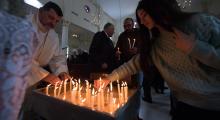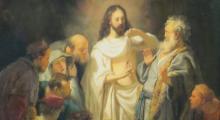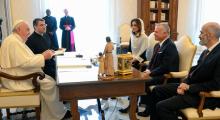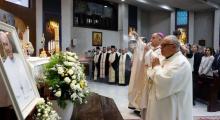Issued by the Catholic Center for Studies and Media - Jordan. Editor-in-chief Fr. Rif'at Bader - موقع أبونا abouna.org
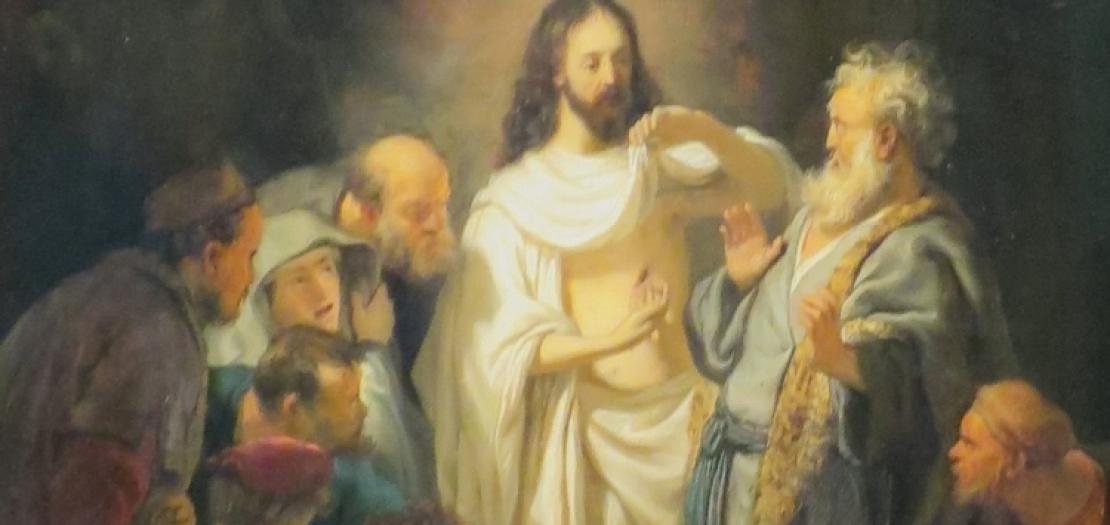
Following is the text of the second Sunday of Easter meditation by His Beatitude Cardinal Pierbattiata Pizzaballa, Latin Patriarch of Jerusalem, dated April 27, 2025:
The Gospels of these first Sundays after Easter tell us about the encounters of the Risen Lord with his disciples: the Lord seeks them out, walks with them, eats with them, reveals Himself as the living Lord who has not abandoned his people, but continues to be present among his own.
These encounters always have two elements.
The first is that it is always the Risen Lord who takes the initiative and makes Himself known.
The Gospels tell us that during His ministry, Jesus often withdrew or went somewhere else and people came on his trail and looked for Him (cf. Mark 1:36-38). After Easter, the Lord can no longer be sought: It is He who seeks His disciples, and only when He seeks them can they meet Him.
The resurrection is precisely this infinitely expanding possibility: today’s account (John 20:19-31) shows us that the Lord no longer has any obstacles to show himself, and locked doors are not enough to keep the Lord out (“when the doors were locked, where the disciples were”. (John 20:19, 26). He is coming, and through His victory over death He has become the One who can always come.
The second element, however, depends on us.
The Risen Lord does not impose himself on our lives: he always remains a proposal, an invitation, and although it is true that he can enter where the disciples are, even when the doors are closed, it is equally true that he does not force the doors of our conscience, of our lives. We must open the doors to him.
And today’s Gospel tells us that in order to open the doors of our lives to Him, we have to take a leap, namely the leap of faith.
In the days of Holy Week, we saw that the great temptation of man is to keep God out of his life. This is what Judas did by handing Jesus over to the leaders of the people, who in turn handed him over to the Roman authorities. But it is also what the crowd did by asking Pilate to crucify him. The entire history of salvation speaks of this temptation from the very beginning.
After all, it is what we have all done to some degree, because God is an uncomfortable and demanding presence, who lays claim to our lives, who knows us to the core, who wants a real relationship with us, and who does not like compromise.
And the Passion stories have told us that if you give in to this temptation, you are walking the path of death: To push God out of one’[s life inevitably leads to living closed and fearful, like the disciples locked in the Cenacle, just as Jesus had been laid low and locked in the tomb.
The risen Lord offers everyone the possibility of a new encounter, and the story of Thomas gives us an example of this. Thomas does not trust his companions when they announce to him that they have seen the Lord, and he does not want to believe that the Lord is alive until he has seen Him with his own eyes and touched Him with his own hands. (John 20:24-25) Well, Jesus reaches out to Thomas and does not spurn his desire to touch and see Him: he comes back to him eight days later, when Thomas is with the other disciples, and offers him his own side, his own wounds, so that Thomas can touch and see them. (John 20:26-27)
This is no mere consolation prize, but a genuine beatitude that Jesus pronounces (“Have you come to believe because you have seen me? Blessed are those who have not seen and have believed.” (John 20:29)
This beatitude applies to all: Blessed are the eyes that see. (cf. Lk. 10:23), but blessed are also the eyes that do not see. (John 20:29)
It is no longer just a matter of seeing the Lord, but of seeing with the eyes of the Lord, of being inhabited, from within by His own life, His own Spirit, which the Risen Lord gives to his disciples as soon as he meets them (“He breathed on them and said to them, “Receive the holy Spirit”. (John 20:22)
There is another indication in this section of the Gospel: Thomas “was not with them when Jesus came”. (John 20:24) He was not with the disciples and could not believe. The Risen Lord returned to the unbelieving disciple when he was gathered with the others, and eyes and the heart of Thomas could open to the wonderful confession of faith (“My Lord and my God!”. (John 20,28) when he was with the disciples. The Lord reveals himself and can be recognized when the disciples are gathered together. It is in the church that we can encounter him in faith today.
+ Pierbattista



